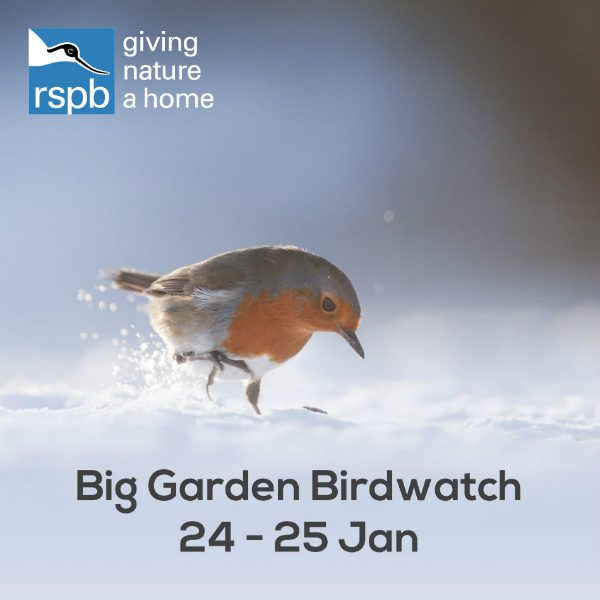The RSPB’s Big Garden Birdwatch 24 and 25 January

Thousands of people across Scotland are expected to count the birds and wildlife in their gardens over the weekend of 24 and 25 January as part of the RSPB’s annual Big Garden Birdwatch. RSPB Scotland will also be holding events at Mersehead nature reserve on the same weekend.
The populations of many of our much loved gardens birds have declined over recent years, and the results collected by the Birdwatch help to paint a picture of how they are faring in peoples’ gardens.
RSPB Scotland is particularly interested in the impact that the warmest year on record in 2014 and the mild winter may have on the birds people count. Although colder weather has moved in over the last few days, the overall warmer temperatures could mean that people see fewer birds in their gardens this year as they’ve been able to feed from wild berries and insects for longer into the winter.
Numbers of winter visitors from Scandinavia and Siberia such as waxwings, redwings, fieldfares and bramblings might be lower than those counted in previous years as they have not needed to move to the UK thanks to plentiful food supplies in North Europe and Asia.
Last year almost 40,000 people in Scotland spent an hour watching their gardens or local parks to record the birds they saw, including 1,880 in Dumfries and Galloway. House sparrows held onto the top spot as the most counted bird in 2014 while chaffinches were the most counted bird in Dumfries and Galloway.
Begun as an activity for junior RSPB members in the 1979, the Birdwatch is now something for everyone to take part in. As with every year, this year’s results will be compared with those from all the previous surveys, building up a picture of bird numbers in gardens across the country, and giving an indication of potentially concerning trends.
Following on from the introduction of other wildlife to the annual count last year RSPB Scotland also wants to know about badgers, snakes, deer, squirrels, hedgehogs and slow worms people see in their local area. Although some of these species will not be out and about during January, the charity is interested in sightings of these species in gardens at any time of the year.
Keith Morton, Species Policy Officer for RSPB Scotland said: “We’ve had some exceptionally mild weather over the past year and this could have a real impact on the birds and wildlife that we see in our gardens and green spaces this winter.
“Thanks to the warmer weather lasting longer into winter birds may well have a ready supply of insects and berries far longer than usual and so make less use of the bird feeders and food that many of us put out for them. If your area is still experiencing this milder weather you might find you count fewer birds than previous years during your Birdwatch hour this year or that some of the migrant birds are missing. However, the recent cold snap across much of the country means that your local birds now really need your help with getting food, water and shelter.
“We’d like as many of you as possible across the country to take part so that together we can build an even greater understanding of how our birds and wildlife are doing this winter compared to previous years. Whatever you count, no matter the number, it will be really important to RSPB Scotland.”
Last year’s Birdwatch showed some worrying results about three birds on the UK ‘red’ list. Starlings, whose stunning murmurations grace our skies in winter, have declined by 84 per cent since the first survey, whilst song thrushes have seen a 81 per cent drop in numbers. House sparrows, despite topping the 2014 survey rankings, also remain a great concern having decreased by 62 per cent since 1979.
Grey squirrels were the most common non-bird species reported in 2014 with 72 per cent of people seeing them in their gardens at least once a month. Red squirrels were only seen in 3 per cent of people’s gardens although this rose to 17 per cent in rural Scotland, indicating where their numbers are strongest.
Anyone can take part in this year’s survey. People are asked to spend just one hour at any time over the Big Garden Birdwatch weekend noting the highest number of each bird species in their garden or local outside space at any one time. Results can be submitted until 13 February via the RSPB website www.rspb.org.uk/birdwatch or by post.
For the non-bird species, participants are asked to let the RSPB know if they ever see this wildlife in their gardens or local outside space at any time of year, rather than only during the Birdwatch hour.
The charity’s Live Bird Counter is quick and easy to use for those taking part in the Birdwatch. People can keep a note of the bird numbers they see on their desktop, laptop or smartphone as well as being provided with hints, tips and trivia during their counting hour.
Schools can also get involved with helping to count our birds and wildlife. Each year around 75,000 children and teachers take part in the Big Schools’ Birdwatch. This year’s Birdwatch began on 5 January and runs until 13 February and schools can pick any hour within this time to take part. Find out more about this great way of getting young people to connect with the nature in and around their schoolgrounds at: www.rspb.org.uk/schoolswatch.
The events at Mersehead are on 24 and 25 January from 11am-1pm and 2pm-4pm with a bird ID course on the Saturday and an opportunity to make your own bird food on the Sunday. The events cost £4 for adults, £2 for children, and are half price for RSPB members. Contact the reserve to book or find out more on 01387 780298 or [email protected]






